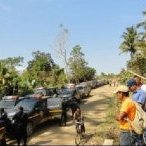
18 March 2011 | Interviews | Human rights | Social activists at risk
The Same Causes
Impunity and violence against peasants: interview with Daniel Pascual, Via Campesina Guatemala
Download: MP3 (1.5 Mb)
The massive and violent eviction that took place on Tuesday 15th in the northern region of Guatemala against 800 peasant families living in unproductive fields owned by a sugarcane company has brought light once again to the difficult situation faced by this Central American country in terms of human rights, land use and tenure and food sovereignty, and where the causes of the armed conflict that took place in the 1970’s seem stronger than ever.
This is what Daniel Pascual, leader of the Guatemalan Peasant Unity Committee (CUC-Via Campesina) said in an interview with Real World Radio, from Valle del Polochic, Alta Verapaz department, Guatemala.
On March 15th, during the eviction of two of the fourteen communities living in those fields, a young peasant was killed and tens of people were injured by the Police, military officers and groups of civilians that represent company Chabil Utzaj that is reclaiming the property of the fields.
Daniel pointed out that massive evictions are commonplace in Guatemala, a country where there are almost 100 cases like this. “This is a clear sign of the need to have an agrarian reform in Guatemala”, said Daniel Pascual.
Hunger, unemployment, and migration from the countryside to the city are some of the painful objective conditions for the debate about the agrarian conflict and the implementation of an agrarian reform in Guatemala. Otherwise, these events will continue to happen, according to the peasant leader, since there are no governmental institutions that protect the rights of the affected families.
Two representatives of the Office of the High Commissioner for Human Rights came to Valle del Polochic to witness the situation, which according to Pascual is a sign of the fact that a deeper investigation on the events and the people responsible will be carried out. The presence of the representatives, and the several international denunciations submitted could avoid new acts of violence against the remaining ten communities in the field.
It was also reported that as the eviction was taking place, the communities were negotiating with the company and government authorities about the fate of these lands, but the negotiations were halted after a court decision in favor of the landowners.
Daniel Pascual said that cases like the one of Valle del Polochic are based on extreme inequality conditions, which coincide with those that caused the hard armed conflict in the country. “The root causes of the armed conflict have not been solved, we have serious situations of organized crime and in fact the number of deaths due to these causes is larger than those after the armed conflict”, he said. “The landowners that used the counter-insurgent strategy are the same ones that are acting in a completely irrational way now with these evictions.”
The production of agrofuels from sugarcane and African oil palm has meant a new push by companies and landowners to deny access to land to the peasants of the country.
Photo: www.prensalibre.com







